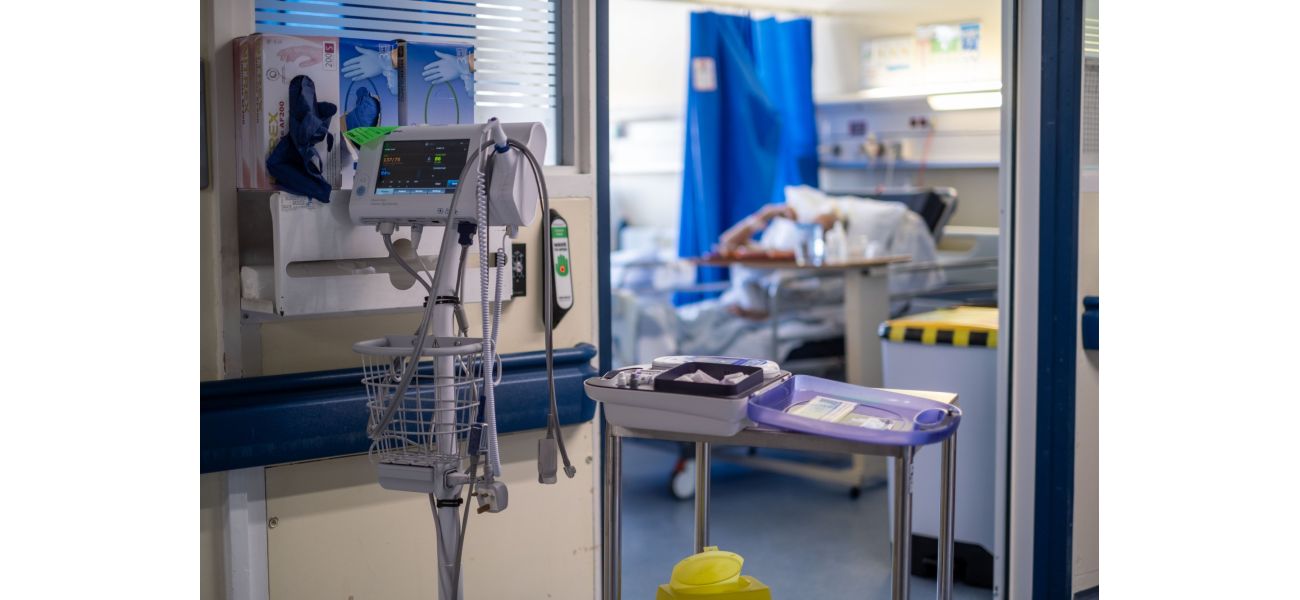Hospitals are struggling with a significant increase in flu-related admissions, causing a major strain on resources.
Hospitals are limiting visitors to safeguard patients as more people are being hospitalized for the flu.
January 3rd 2025.

The latest data from NHS England paints a concerning picture regarding the rising number of flu patients in hospitals. According to the figures, the average number of patients with flu in beds each day last week was 4,469, with 211 of them in critical care. This is a 17% increase from the previous week when there were 3,818 flu patients, including 184 in critical care. The current number is also more than four times higher than it was a month ago on December 1st when there were only 1,098 flu patients in hospital.
Comparing the current situation to last year, the average number of flu patients in hospital in England last week is significantly higher than the equivalent week in the previous winter, with an average of 1,312 patients. However, it is lower than the figure from two years ago when there were 5,441 patients in hospital with the flu. Professor Julian Redhead, NHS national clinical director for urgent and emergency care, expressed concern over the rising numbers, stating that the pressure from flu is not showing any signs of easing up as we head into the New Year.
The UK Health Security Agency has classified flu admissions as having a "high impact" on hospitals in England. Last week, the admission rate for flu patients stood at 14.1 per 100,000 people, the highest so far this season and an increase from the previous week's rate of 10.7. The most affected age group is currently those aged 85 and over, with a rate of 88.4 per 100,000, followed by 75-84 year-olds and children aged four and under. This rise in flu cases has led to some hospitals across the country implementing restrictions on visitors to protect their patients.
Professor Susan Hopkins, UKHSA chief medical adviser, explained that the festive period is often a time for social gatherings and parties, making it a common time for an increase in flu cases. However, she also emphasized the importance of getting the flu vaccine, as it can significantly reduce the risk of severe flu symptoms. She urged those who are eligible for the vaccine to take it, as the high levels of flu are expected to continue for some weeks. This is especially crucial for health and social care workers, as they are currently facing significant pressures due to the winter season.
Along with the rise in flu cases, the data also showed an average of 528 hospital beds in England were filled each day last week by patients with diarrhoea and vomiting or norovirus-like symptoms, down from 723 the previous week but higher than the equivalent figure at this point last winter and two years ago. In addition, there were an average of 74 children with respiratory syncytial virus in hospital wards in England last week, down from 87 the previous week but higher than at this point a year ago.
The number of hospital beds occupied each day by patients who had tested positive for Covid-19 averaged 1,184, down from 1,277 the previous week. Professor Redhead noted that the pressure from flu is on top of the ongoing pressure from Covid, as well as cases of RSV and norovirus being higher than last year. As a result, hospitals have had to add an extra 1,300 beds last week compared to the same time last year to meet the demand.
With a cold snap expected across England before the weekend, Professor Redhead reminded those who are vulnerable or have respiratory conditions to stay warm and have their regular medication on hand. Some hospitals have already taken measures to protect their patients, such as the Shrewsbury and Telford Hospital NHS Trust, Mid and South Essex NHS Foundation Trust, Cambridge University Hospitals NHS Foundation Trust, and Worcestershire Acute Hospitals NHS Trust, who have all implemented visitor policy changes.
Looking at the data for England, it is evident that this winter is proving to be a challenging time for the NHS. The latest figures show that 32.1% of patients arriving by ambulance at hospitals in England last week waited at least 30 minutes to be handed over to A&E teams, down from 36.9% in the previous week but higher than the equivalent week last winter. Additionally, 12.9% of ambulance handovers last week, or 12,229 patients, were delayed by more than an hour, down from 16.3% the previous week but higher than this point a year ago.
NHS Confederation chief executive Matthew Taylor acknowledged the intense pressures that local NHS leaders are facing, with sicker patients and high levels of flu to deal with. He emphasized the need for support for staff and services during this challenging time. Health Secretary Wes Streeting also recognized the pressure on the NHS, stating that the government has taken steps to mitigate risks this winter through investments and reforms, including addressing the social care crisis. However, he also acknowledged that the current situation is not sustainable, and long-term solutions are needed.
Comparing the current situation to last year, the average number of flu patients in hospital in England last week is significantly higher than the equivalent week in the previous winter, with an average of 1,312 patients. However, it is lower than the figure from two years ago when there were 5,441 patients in hospital with the flu. Professor Julian Redhead, NHS national clinical director for urgent and emergency care, expressed concern over the rising numbers, stating that the pressure from flu is not showing any signs of easing up as we head into the New Year.
The UK Health Security Agency has classified flu admissions as having a "high impact" on hospitals in England. Last week, the admission rate for flu patients stood at 14.1 per 100,000 people, the highest so far this season and an increase from the previous week's rate of 10.7. The most affected age group is currently those aged 85 and over, with a rate of 88.4 per 100,000, followed by 75-84 year-olds and children aged four and under. This rise in flu cases has led to some hospitals across the country implementing restrictions on visitors to protect their patients.
Professor Susan Hopkins, UKHSA chief medical adviser, explained that the festive period is often a time for social gatherings and parties, making it a common time for an increase in flu cases. However, she also emphasized the importance of getting the flu vaccine, as it can significantly reduce the risk of severe flu symptoms. She urged those who are eligible for the vaccine to take it, as the high levels of flu are expected to continue for some weeks. This is especially crucial for health and social care workers, as they are currently facing significant pressures due to the winter season.
Along with the rise in flu cases, the data also showed an average of 528 hospital beds in England were filled each day last week by patients with diarrhoea and vomiting or norovirus-like symptoms, down from 723 the previous week but higher than the equivalent figure at this point last winter and two years ago. In addition, there were an average of 74 children with respiratory syncytial virus in hospital wards in England last week, down from 87 the previous week but higher than at this point a year ago.
The number of hospital beds occupied each day by patients who had tested positive for Covid-19 averaged 1,184, down from 1,277 the previous week. Professor Redhead noted that the pressure from flu is on top of the ongoing pressure from Covid, as well as cases of RSV and norovirus being higher than last year. As a result, hospitals have had to add an extra 1,300 beds last week compared to the same time last year to meet the demand.
With a cold snap expected across England before the weekend, Professor Redhead reminded those who are vulnerable or have respiratory conditions to stay warm and have their regular medication on hand. Some hospitals have already taken measures to protect their patients, such as the Shrewsbury and Telford Hospital NHS Trust, Mid and South Essex NHS Foundation Trust, Cambridge University Hospitals NHS Foundation Trust, and Worcestershire Acute Hospitals NHS Trust, who have all implemented visitor policy changes.
Looking at the data for England, it is evident that this winter is proving to be a challenging time for the NHS. The latest figures show that 32.1% of patients arriving by ambulance at hospitals in England last week waited at least 30 minutes to be handed over to A&E teams, down from 36.9% in the previous week but higher than the equivalent week last winter. Additionally, 12.9% of ambulance handovers last week, or 12,229 patients, were delayed by more than an hour, down from 16.3% the previous week but higher than this point a year ago.
NHS Confederation chief executive Matthew Taylor acknowledged the intense pressures that local NHS leaders are facing, with sicker patients and high levels of flu to deal with. He emphasized the need for support for staff and services during this challenging time. Health Secretary Wes Streeting also recognized the pressure on the NHS, stating that the government has taken steps to mitigate risks this winter through investments and reforms, including addressing the social care crisis. However, he also acknowledged that the current situation is not sustainable, and long-term solutions are needed.
[This article has been trending online recently and has been generated with AI. Your feed is customized.]
[Generative AI is experimental.]
0
0
Submit Comment





